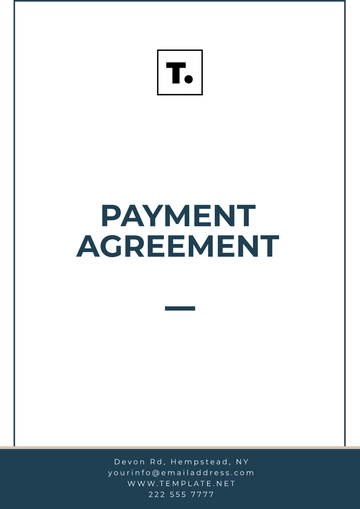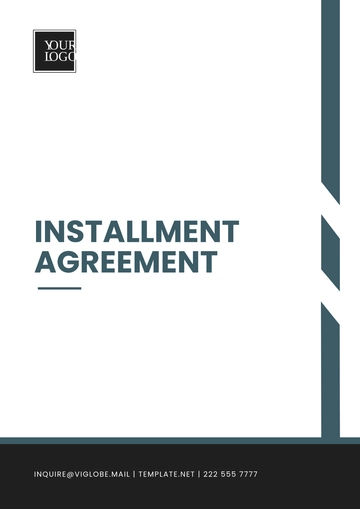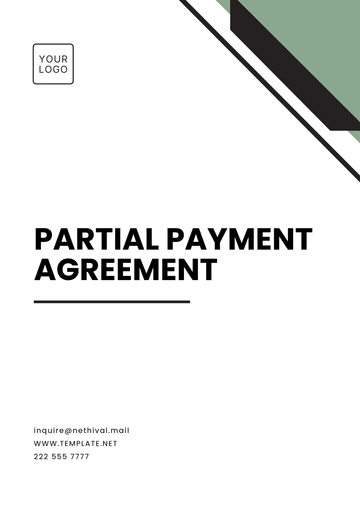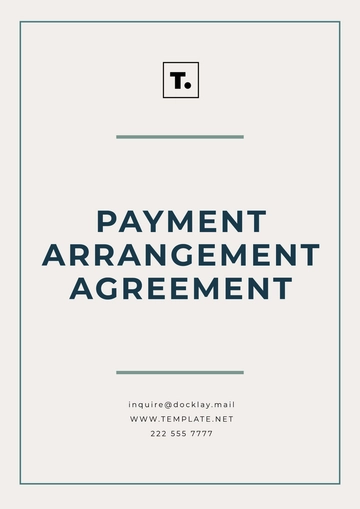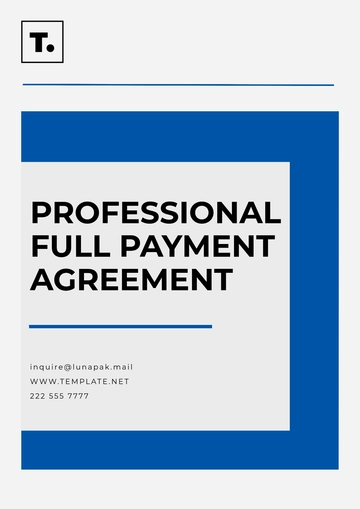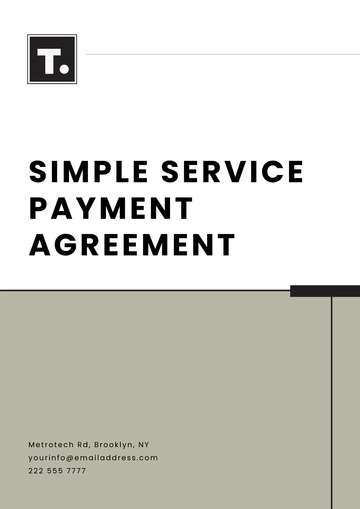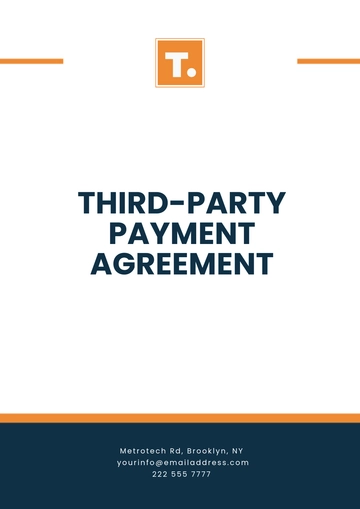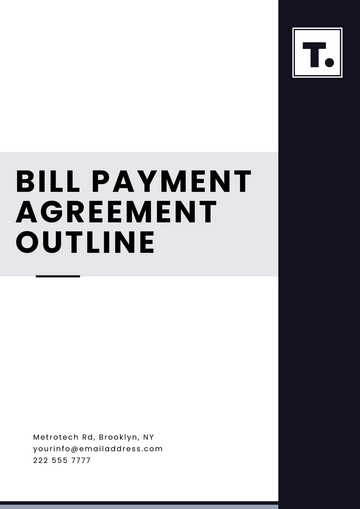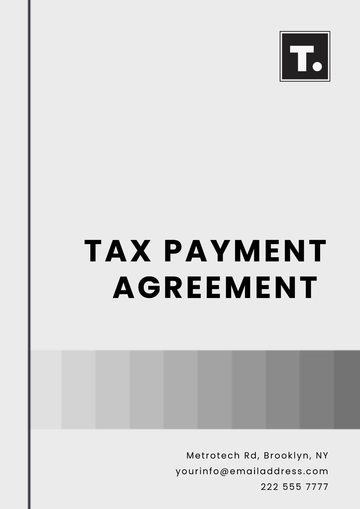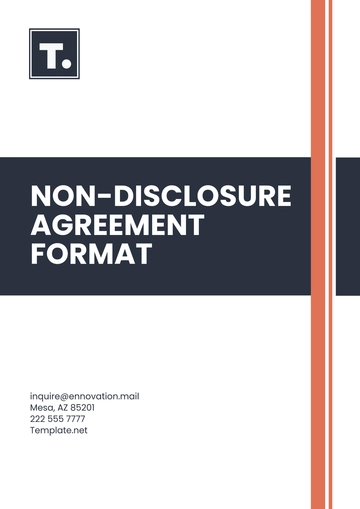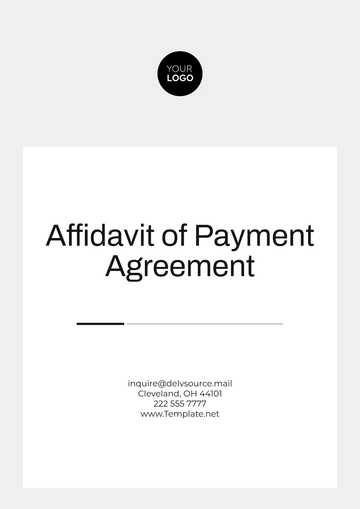Free Agriculture Payment Agreement
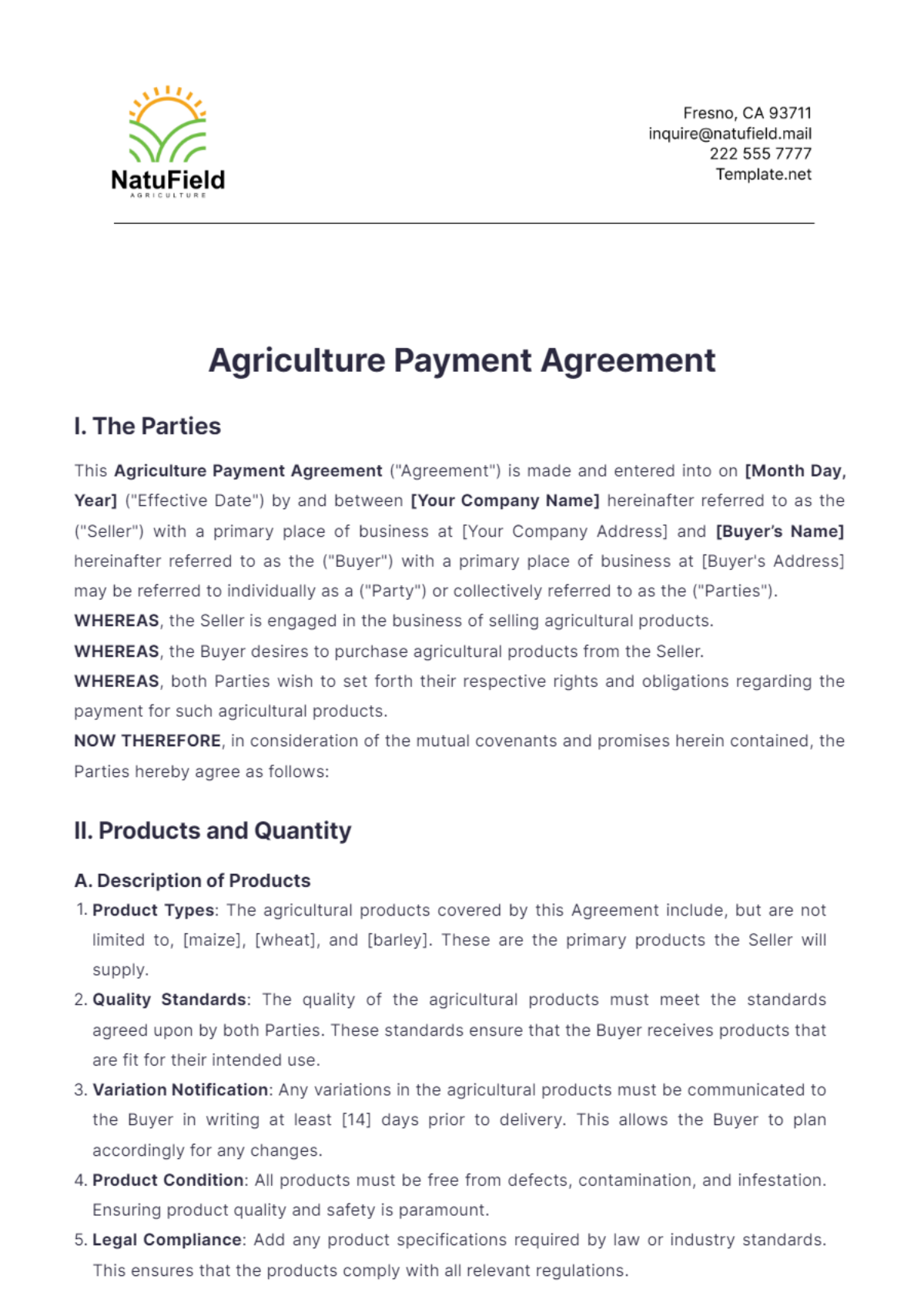
I. The Parties
This Agriculture Payment Agreement ("Agreement") is made and entered into on [Month Day, Year] ("Effective Date") by and between [Your Company Name] hereinafter referred to as the ("Seller") with a primary place of business at [Your Company Address] and [Buyer’s Name] hereinafter referred to as the ("Buyer") with a primary place of business at [Buyer's Address] may be referred to individually as a ("Party") or collectively referred to as the ("Parties").
WHEREAS, the Seller is engaged in the business of selling agricultural products.
WHEREAS, the Buyer desires to purchase agricultural products from the Seller.
WHEREAS, both Parties wish to set forth their respective rights and obligations regarding the payment for such agricultural products.
NOW THEREFORE, in consideration of the mutual covenants and promises herein contained, the Parties hereby agree as follows:
II. Products and Quantity
A. Description of Products
Product Types: The agricultural products covered by this Agreement include, but are not limited to, [maize], [wheat], and [barley]. These are the primary products the Seller will supply.
Quality Standards: The quality of the agricultural products must meet the standards agreed upon by both Parties. These standards ensure that the Buyer receives products that are fit for their intended use.
Variation Notification: Any variations in the agricultural products must be communicated to the Buyer in writing at least [14] days prior to delivery. This allows the Buyer to plan accordingly for any changes.
Product Condition: All products must be free from defects, contamination, and infestation. Ensuring product quality and safety is paramount.
Legal Compliance: Add any product specifications required by law or industry standards. This ensures that the products comply with all relevant regulations.
B. Quantity
Annual Quantity: The total quantity of agricultural products to be delivered under this Agreement is [10,000] metric tons annually. This sets the expectation for the total amount of products the Buyer will receive each year.
Quarterly Deliveries: Each delivery shall contain a quantity of [2,000] metric tons, delivered every quarter. Regular deliveries help ensure a steady supply of products for the Buyer.
Variation Agreement: Any variations in the delivery quantity must be agreed upon in writing by both Parties at least [30] days in advance. This prevents any misunderstandings or disruptions in supply.
Availability Assurance: The Seller must ensure the consistent and timely availability of the agreed quantity of products. Reliability in supply is crucial for the Buyer’s operations.
C. Delivery Schedules
Scheduled Deliveries: Deliveries will occur on the [1st] business day of [January], [April], [July], and [October]. Consistent delivery dates facilitate the Buyer’s planning.
Delivery Adjustments: The Buyer reserves the right to reschedule deliveries with at least [30] days' notice to the Seller. Flexibility in scheduling can accommodate unforeseen circumstances.
Logistics Communication: Any changes in delivery logistics must be communicated and agreed upon in writing. Clear communication ensures smooth delivery processes.
III. Purchase Price
A. Base Price
Initial Pricing: The base price for the agricultural products shall be [$500] per metric ton. This sets the initial cost per unit of product.
Price Adjustments: The Parties may mutually agree in writing to adjust the base price due to market conditions. This allows flexibility to adapt to market changes.
Annual Review: Base prices shall be reviewed and possibly revised annually, or as agreed by both Parties. Regular reviews ensure the price remains fair and reflective of current market conditions.
B. Additional Costs
Itemized Costs: The Seller shall provide an itemized list of any additional costs in each invoice. Transparency in billing helps the Buyer understand all charges.
Approval for Extra Costs: Additional costs not stated in this Agreement must be approved in writing by the Buyer. This prevents unexpected expenses from arising.
Subsidies and Rebates: If applicable, any governmental subsidies or rebates shall be passed directly to the Buyer. This ensures the Buyer benefits from any available financial assistance.
C. Payment Terms
Installment Payments: The total purchase price shall be payable in [4] equal installments. Spreading payments over time makes the financial burden more manageable for the Buyer.
Payment Due Dates: Each installment shall be due [30] days following the delivery of each quarterly shipment. This provides a clear timeline for when payments are expected.
Final Payment: The final installment shall be paid no later than [Month Day, Year]. This ensures the Seller receives full payment within the agreed period.
IV. Payment Terms
A. Payment Schedule
Installment Payments: The total purchase price shall be payable in [4] equal installments. This allows the Buyer to manage their cash flow more effectively.
Due Dates: Each installment shall be due [30] days following the delivery of each quarterly shipment. This creates a predictable payment schedule for the Buyer.
Final Installment: The final installment shall be paid no later than [Month Day, Year]. This ensures the Seller receives full payment within the specified timeframe.
Check Payments: For payments made by check, the date of receipt shall be considered the payment date. This provides clarity on when payments are officially made.
Currency: All payments must be made in U.S. dollars. This standardizes the currency used for transactions, avoiding exchange rate issues.
B. Late Payments and Penalties
Late Fee: Payments not made by the due date shall incur a late fee of [1.5]% per month. This encourages timely payments and compensates the Seller for the delay.
Suspension of Deliveries: Any payment more than [30] days overdue may trigger a suspension of further deliveries. This protects the Seller from continuing to supply products without payment.
Termination for Repeated Delays: Repeated late payments may result in the termination of this Agreement by the Seller. Consistent late payments indicate a risk to the Seller’s financial interests.
Collection Costs: The Buyer will be responsible for any attorney fees and costs incurred in the collection of overdue payments. This ensures the Seller can recover the full amount owed.
C. Discounts for Early Payments
Early Payment Discount: The Buyer shall receive a [2]% discount for payments made within [7] days of the invoice date. This incentivizes early payments.
Discount Calculation: The discount will be calculated based on the total invoice amount before additional costs and taxes. This provides a clear method for determining the discount amount.
Application of Discounts: Early payment discounts shall be applied as a credit to the next invoice or refunded if no pending invoices exist. This flexibility ensures the Buyer benefits from early payment discounts.
Receipt Confirmation: Sellers must confirm receipt of early payments in writing to validate the discount. This prevents any disputes over the application of discounts.
Discrepancy Resolution: If any discrepancies arise regarding early payment discounts, they must be resolved within [15] days. Timely resolution of issues maintains good business relations.
V. Taxes and Other Charges
A. Sales Tax
Buyer’s Responsibility: All applicable sales taxes will be the responsibility of the Buyer. This ensures that tax liabilities are clearly assigned.
Itemized Tax: The Seller will itemize any sales tax in the invoice provided to the Buyer. This provides transparency in billing and compliance with tax regulations.
Tax Exemptions: If the Buyer is eligible for any tax exemptions, they must provide the necessary documentation to the Seller. This allows the Seller to apply exemptions correctly.
B. Import/Export Duties
Buyer's Responsibility: All import/export duties, if applicable, shall be borne by the Buyer. This allocates the financial burden of cross-border trade to the Buyer.
Direct Payments: Duties not included in the invoice must be paid directly by the Buyer to the relevant authorities. This ensures compliance with customs regulations.
Documentation: The Seller shall provide any necessary documentation to assist the Buyer in fulfilling their duty obligations. This supports smooth and compliant import/export processes.
Changes in Duties: Any changes in import/export duties must be communicated promptly to the Buyer. This allows the Buyer to anticipate and manage any additional costs.
C. Other Charges
Handling Fees: The Seller may include handling fees in the invoice, provided they are reasonable and justified. This compensates the Seller for any additional handling of the products.
Storage Costs: If the Buyer delays acceptance of the delivery, they may be responsible for any additional storage costs incurred. This encourages timely receipt of goods.
Insurance Premiums: Any insurance premiums for transporting the products shall be detailed and approved by the Buyer. This ensures the Buyer is aware of and agrees to these costs.
Administrative Charges: Administrative charges, if any, must be outlined and justified by the Seller. Transparency in all additional charges builds trust between the Parties.
VI. Delivery Terms
A. Delivery Schedule
Quarterly Deliveries: The Seller shall deliver the agricultural products on a quarterly basis. This ensures a regular supply of products for the Buyer.
Delivery Dates: Delivery dates shall be the [1st] business day of [January], [April], [July], and [October]. This provides specific dates for the Buyer to expect deliveries.
Rescheduling Rights: The Buyer reserves the right to reschedule deliveries with at least [30] days' notice to the Seller. This flexibility accommodates unforeseen changes in the Buyer’s needs.
Penalty for Delays: Timely delivery is critical, and delays may subject the Seller to penalties. This incentivizes the Seller to meet delivery deadlines.
Logistics Communication: Any changes in delivery logistics must be communicated and agreed upon in writing. Clear communication ensures smooth delivery operations.
B. Risk of Loss
Risk Transfer: The risk of loss or damage to the products shall pass to the Buyer upon delivery. This clarifies when the Buyer assumes responsibility for the products.
Insurance Coverage: Both Parties shall maintain adequate insurance coverage for the products during transit. This provides protection against potential losses during transportation.
Joint Inspection: If any dispute arises regarding loss or damage, both Parties agree to jointly inspect the products. This collaborative approach helps resolve issues fairly.
Immediate Notification: The Seller must notify the Buyer immediately of any known risks affecting delivery. Prompt communication allows the Buyer to take necessary precautions.
Documentation: All products must be delivered with accompanying documentation that verifies their condition and quantity. Proper documentation supports accountability and quality assurance.
C. Delivery Documentation
Verification Records: Each delivery must include documentation verifying the quantity and condition of the products. Accurate records help both Parties track and verify deliveries.
Compliance Certificates: The Seller shall provide any necessary compliance certificates with each delivery. These documents confirm that the products meet agreed standards and regulations.
Shipping Details: Detailed shipping documents must be provided, including carrier information and tracking numbers. This facilitates monitoring and management of deliveries.
Receipt Confirmation: The Buyer must acknowledge receipt of the products in writing. This confirmation is important for record-keeping and dispute resolution.
Discrepancy Reports: Any discrepancies found upon delivery must be reported to the Seller within [5] business days. Timely reporting allows for quick resolution of issues.
VII. Warranties
A. Seller's Warranties
Product Quality: The Seller warrants that the agricultural products shall be of merchantable quality. This ensures the Buyer receives products that are suitable for sale or use.
Legal Compliance: The products shall conform to all applicable laws and regulations. Compliance with legal standards protects both Parties from potential liabilities.
Clear Title: The products shall be free from liens or encumbrances. This guarantees that the Seller has the legal right to sell the products.
Authority to Sell: The Seller has full right and authority to sell the products to the Buyer. This warranty ensures that the Seller is legally permitted to enter into this transaction.
Additional Warranties: All warranties provided are in addition to any statutory warranties that may apply. This provides the Buyer with comprehensive protection.
B. Buyer's Warranties
Financial Capability: The Buyer warrants that they have the financial capability to fulfill the payment obligations. This reassures the Seller of the Buyer’s ability to pay.
Regulatory Compliance: The Buyer shall comply with all applicable laws and regulations regarding the purchase and use of the products. Compliance ensures the Buyer can legally use the products.
Authority to Purchase: The Buyer has full right and authority to enter into this Agreement. This warranty ensures that the Buyer is legally permitted to engage in this transaction.
Representation Accuracy: Any representations made by the Buyer during negotiations are warranties incorporated into this Agreement. This ensures that all statements made by the Buyer are reliable and binding.
VIII. Dispute Resolution
A. Negotiation
Good Faith Effort: In case of any dispute, the Parties agree to first attempt to negotiate a resolution in good faith. This encourages an amicable settlement without litigation.
Negotiation Timeline: Negotiation discussions shall be conducted within [30] days of the dispute arising. This sets a clear timeframe for initiating resolution efforts.
Further Steps: If negotiations fail, the Parties may proceed to mediation as outlined below. This provides a structured approach to resolving disputes.
B. Mediation
Mediation Attempt: If negotiation fails, the Parties shall attempt to resolve the dispute through mediation. This step aims to find a mutually agreeable solution with the help of a mediator.
Mediator Selection: The mediator shall be mutually agreed upon by both Parties. This ensures that the mediator is impartial and acceptable to both sides.
Confidential Sessions: Mediation sessions shall be confidential and without prejudice to any subsequent legal proceedings. Confidentiality encourages open and honest discussions.
C. Arbitration
Binding Arbitration: If mediation fails to resolve the dispute, the Parties agree to binding arbitration. This final step provides a conclusive resolution.
Arbitration Rules: Arbitration shall be conducted by a single arbitrator in accordance with the rules of the American Arbitration Association. This ensures a standardized and fair process.
Final Decision: The decision of the arbitrator shall be final and binding upon both Parties. This provides a definitive end to the dispute resolution process.
IX. Termination
A. Termination for Cause
Notice Period: Either Party may terminate this Agreement for cause by providing [30] days' written notice to the other Party. This allows for a structured end to the Agreement.
Material Breach: Cause for termination includes material breach of this Agreement. This provides grounds for ending the Agreement if significant terms are violated.
Outstanding Payments: Upon termination, all outstanding payments shall become immediately due and payable. This ensures the Seller receives compensation for delivered products.
B. Termination for Convenience
Convenience Notice: Either Party may terminate this Agreement for convenience by providing [60] days' written notice to the other Party. This allows for an orderly and planned termination.
Obligation Fulfillment: Termination for convenience does not absolve any Party of their obligations incurred prior to termination. This ensures all prior commitments are honored.
Final Invoices: Upon termination, the Buyer shall pay any outstanding invoices up to the termination date. This guarantees the Seller is compensated for products supplied before termination.
C. Effects of Termination
Inventory Handling: The Buyer must return or purchase any remaining inventory of agricultural products upon termination. This clears any outstanding stock.
Final Reconciliation: Both Parties shall reconcile accounts and settle any outstanding balances within [30] days of termination. This ensures all financial matters are concluded.
Post-Termination Obligations: Certain obligations, such as confidentiality and indemnity, may survive termination. This provides ongoing protection and compliance with key terms.
Documentation Return: Both Parties must return any proprietary documents or materials received from the other Party. This safeguards confidential information.
Dispute Resolution Continuation: Any disputes arising from the termination shall still be subject to the dispute resolution process outlined in this Agreement. This ensures fair handling of termination-related issues.
X. Miscellaneous
A. Notices
Written Communications: All notices required or permitted under this Agreement shall be in writing. This ensures clarity and documentation of all important communications.
Deemed Delivery: Notices shall be deemed given when delivered personally, or [5] days after being sent by certified mail to the respective addresses of the Parties. This sets a standard for when notices are considered received.
Address Changes: Both Parties shall promptly notify each other of any change in address. This ensures that all communications are directed to the correct location.
B. Governing Law
Applicable Law: This Agreement shall be governed by and construed in accordance with the laws of the State of [State Name]. This determines the legal framework for interpreting the Agreement.
Jurisdiction and Venue: Any legal action under this Agreement shall be brought in the appropriate courts of [State Name]. This specifies the location for any legal proceedings.
Waiver of Objections: The Parties waive any objections to the jurisdiction and venue of such courts. This ensures that both Parties accept the specified legal forum.
C. Amendments
Written Modifications: No amendments, modifications, or waivers of any provisions of this Agreement shall be valid unless in writing and signed by both Parties. This ensures that all changes are formally documented.
Binding Amendments: Any amendment effected by mutual agreement shall be binding on both Parties. This guarantees that agreed changes are enforceable.
Regulatory Changes: The Buyer may request amendments due to changes in regulatory requirements. This allows the Agreement to adapt to new legal standards.
D. Confidentiality
Confidential Information: Both Parties agree to keep all non-public, confidential, or proprietary information disclosed by the other Party confidential. This protects sensitive business information.
Use of Information: Confidential information shall be used solely for the purpose of fulfilling obligations under this Agreement. This restricts the use of sensitive data to relevant business activities.
Disclosure Restrictions: Neither Party shall disclose any confidential information to any third party without the prior written consent of the other Party. This prevents unauthorized sharing of information.
Duration of Confidentiality: The obligation to maintain confidentiality shall continue for [5] years after the termination of this Agreement. This ensures long-term protection of confidential information.
Exceptions: Confidentiality obligations shall not apply to information that is publicly known, independently developed, or lawfully obtained from a third party. This clarifies the scope of confidentiality requirements.
XI. Signatures
IN WITNESS WHEREOF, the Parties have duly executed this Payment Agreement as of the Effective Date.
Seller

[Authorized Representative Name]
[Your Company Name]
Date: [Month Day, Year]
Buyer

[Buyer's Name]
Date: [Month Day, Year]
- 100% Customizable, free editor
- Access 1 Million+ Templates, photo’s & graphics
- Download or share as a template
- Click and replace photos, graphics, text, backgrounds
- Resize, crop, AI write & more
- Access advanced editor
Simplify transactions with our Agriculture Payment Agreement Template! Available on Template.net, this template offers fully editable fields to customize the agreement to your terms. Customizable sections enable the inclusion of your business branding. The integrated AI Editor Tool enhances efficiency, ensuring an accurate payment agreement tailored to your agricultural needs!
You may also like
- Lease Agreement
- Non Compete Agreement
- Rental Agreement
- Prenuptial Agreement
- Non Disclosure Agreement
- Operating Agreement
- Hold Harmless Agreement
- LLC Operating Agreement
- Arbitration Agreement
- Purchase Agreement
- Residential Lease Agreement
- Executive Agreement
- Confidentiality Agreement
- Contractor Agreement
- Partnership Agreement
- Postnuptial Agreement
- Collective Bargaining Agreement
- Loan Agreement
- Roommate Agreement
- Commercial Lease Agreement
- Separation Agreement
- Cohabitation Agreement
- Room Rental Agreement
- Child Custody Agreement
- Employee Agreement
- License Agreements
- Settlement Agreement
- Joint Venture Agreement
- Indemnity Agreement
- Subordination Agreement
- Sales Agreement
- Agreements Between Two Parties
- Business Agreement
- Real Estate Agreement
- HR Agreement
- Service Agreement
- Property Agreement
- Agreement Letter
- Restaurant Agreement
- Construction Agreement
- Finance Agreement
- Marketing Agreement
- Payment Agreement
- Investment Agreement
- Management Agreement
- Nonprofit Agreement
- Software Agreement
- Startup Agreement
- Agency Agreement
- Copyright Agreement
- Collaboration Agreement
- Reseller Agreement
- Car Rental Agreement
- Cleaning Services Agreement
- Consultant Agreement
- Deed Agreement
- Car Agreement
- Equipment Agreement
- Shares Agreement
- Data Sharing Agreement
- Advertising Agreement
- School Agreement
- Franchise Agreement
- Event Agreement
- Travel Agency Agreement
- Vehicle Agreement
- Board Resolution Agreement
- Land Agreement
- Binding Agreement
- Tenancy Agreement
- Exclusive Agreement
- Development Agreement
- Assignment Agreement
- Design Agreement
- Equity Agreement
- Mortgage Agreement
- Purchase and Sale Agreement
- Shareholder Agreement
- Vendor Agreement
- Royalty Agreement
- Vehicle Lease Agreement
- Hotel Agreement
- Tenant Agreement
- Artist Agreement
- Commission Agreement
- Consignment Agreement
- Debt Agreement
- Recruitment Agreement
- Training Agreement
- Transfer Agreement
- Apprenticeship Agreement
- IT and Software Agreement
- Referral Agreement
- Resolution Agreement
- Waiver Agreement
- Consent Agreement
- Partner Agreement
- Social Media Agreement
- Customer Agreement
- Credit Agreement
- Supply Agreement
- Agent Agreement
- Brand Agreement
- Law Firm Agreement
- Maintenance Agreement
- Mutual Agreement
- Retail Agreement
- Deposit Agreement
- Land Purchase Agreement
- Nursing Home Agreement
- Supplier Agreement
- Buy Sell Agreement
- Child Support Agreement
- Landlord Agreement
- Payment Plan Agreement
- Release Agreement
- Research Agreement
- Sponsorship Agreement
- Buyout Agreement
- Equipment Rental Agreement
- Farm Agreement
- Manufacturing Agreement
- Strategic Agreement
- Termination of Lease Agreement
- Compliance Agreement
- Family Agreement
- Interior Design Agreement
- Ownership Agreement
- Residential Lease Agreement
- Retainer Agreement
- Trade Agreement
- University Agreement
- Broker Agreement
- Dissolution Agreement
- Funding Agreement
- Hosting Agreement
- Investor Agreement
- Memorandum of Agreement
- Advisory Agreement
- Affiliate Agreement
- Freelancer Agreement
- Grant Agreement
- Master Service Agreement
- Parking Agreement
- Subscription Agreement
- Trust Agreement
- Cancellation Agreement
- Horse Agreement
- Influencer Agreement
- Membership Agreement
- Vacation Rental Agreement
- Wholesale Agreement
- Author Agreement
- Distributor Agreement
- Exchange Agreement
- Food Agreement
- Guarantee Agreement
- Installment Agreement
- Internship Agreement
- Music Agreement
- Severance Agreement
- Software Development Agreement
- Storage Agreement
- Facility Agreement
- Intercompany Agreement
- Lending Agreement
- Lodger Agreement
- Outsourcing Services Agreement
- Usage Agreement
- Assurance Agreement
- Photography Agreement
- Profit Sharing Agreement
- Relationship Agreement
- Rent To Own Agreement
- Repayment Agreement
- Volunteer Agreement
- Co Parenting Agreement
- HVAC Agreement
- Lawn Care Agreement
- SAAS Agreement
- Work from Home Agreement
- Coaching Agreement
- Protection Agreement
- Security Agreement
- Repair Agreement
- Agreements License
